元音字母与元音字母组合的发音
元音字母及元音字母组合
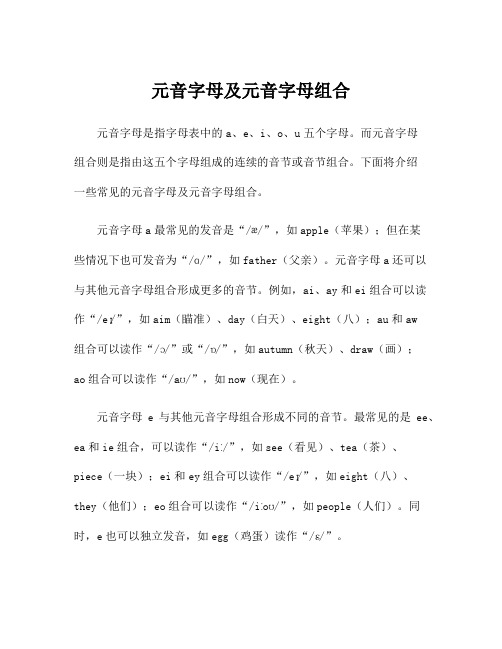
元音字母及元音字母组合元音字母是指字母表中的a、e、i、o、u五个字母。
而元音字母组合则是指由这五个字母组成的连续的音节或音节组合。
下面将介绍一些常见的元音字母及元音字母组合。
元音字母a最常见的发音是“/æ/”,如apple(苹果);但在某些情况下也可发音为“/ɑ/”,如father(父亲)。
元音字母a还可以与其他元音字母组合形成更多的音节。
例如,ai、ay和ei组合可以读作“/eɪ/”,如aim(瞄准)、day(白天)、eight(八);au和aw组合可以读作“/ɔ/”或“/ɒ/”,如autumn(秋天)、draw(画);ao组合可以读作“/aʊ/”,如now(现在)。
元音字母e与其他元音字母组合形成不同的音节。
最常见的是ee、ea和ie组合,可以读作“/iː/”,如see(看见)、tea(茶)、piece(一块);ei和ey组合可以读作“/eɪ/”,如eight(八)、they(他们);eo组合可以读作“/iːoʊ/”,如people(人们)。
同时,e也可以独立发音,如egg(鸡蛋)读作“/ɛ/”。
元音字母i在大部分情况下发音为“/ɪ/”,如it(它);但在某些情况下也可发音为“/aɪ/”,如quiet(安静)。
i还可以与其他元音字母组合形成更多的音节。
例如,ie和ei组合可以读作“/iː/”,如pie(馅饼)、eight(八);ay、ey和ai组合可以读作“/eɪ/”,如day(白天)、they(他们)、aisle(过道)。
元音字母o最常见的发音是“/ɒ/”,如dog(狗);但在某些情况下也可发音为“/əʊ/”,如go(去);还可以发音为“/ɔː/”,如more(更多)。
o也可以与其他元音字母形成不同的音节。
例如,oa 和oe组合可以读作“/oʊ/”,如boat(船)、toe(脚趾);ou和ow 组合可以读作“/aʊ/”,如house(房子)。
元音字母u最常见的发音是“/ʌ/”,如up(向上);但在某些情况下也可发音为“/juː/”,如fruit(水果)。
元音字母组合发音
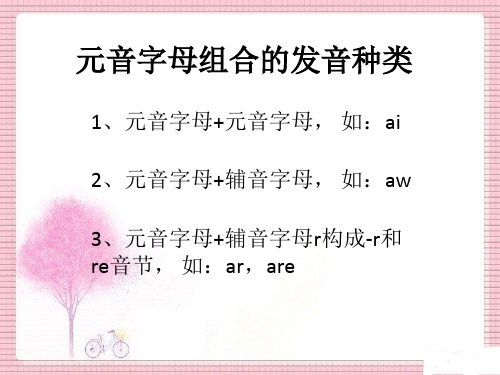
(5)、ex分别读作 [iks ],例: excuse, express, expensive; [eks], 例: expert, extra , excellent [igz] , 例: exact, examine, example
三、字母i的组合
(1)、ie 分别读作 [i:],例: piece, thief, field; 例外: friend[e] [ai], 例: die, lie, tie;例外: quiet, society[aiə] (2)、igh读作[ai],例: dight, high, hight, night (3)、ire读作[aiə],例: fire, hire, tire, admire (4)、io读作[aiə],例: lion (5)、ir读作[ə:],例: girl, bird, first, dirty, third
(2)、ee读作[i: ],例: meet, see, tree, street, deep
(3)、ear分别读作 [iə ],例: ear, hear, clear, nearly; 例外:heart[a:] [ə:], 例: earn, learn , heard [εə] , 例: wear, bear
练习
(D)1. A. giant B. diary C. diamond D. piano (D)2. A. believe B. piece C. field D. science
四、字母o的组合
(1)、oa 读作[əu],例: coat, road, load; 例外: broad[ɔ:] (2)、oi(oy)读作[ɔi],例: oil, noise, voice, boy, joy, toilet (3)、oo常读作[u:],例: school, fool, loom, soon, zoo oo在k和d前读作[u],例: look, took, cook,good oo前是l后是d时读作[ʌ],例: blood, flood
元音字母组合发音规则
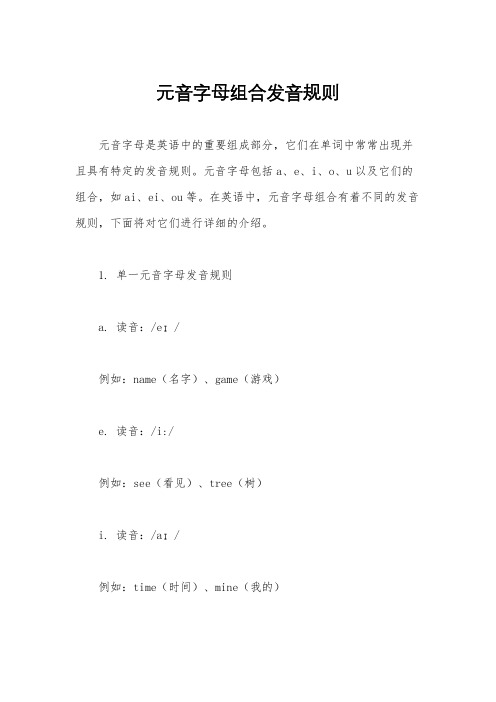
元音字母组合发音规则元音字母是英语中的重要组成部分,它们在单词中常常出现并且具有特定的发音规则。
元音字母包括a、e、i、o、u以及它们的组合,如ai、ei、ou等。
在英语中,元音字母组合有着不同的发音规则,下面将对它们进行详细的介绍。
1. 单一元音字母发音规则a. 读音:/eɪ/例如:name(名字)、game(游戏)e. 读音:/i:/例如:see(看见)、tree(树)i. 读音:/aɪ/例如:time(时间)、mine(我的)例如:go(去)、home(家)u. 读音:/ju:/例如:use(使用)、music(音乐) 2. 元音字母组合发音规则ai. 读音:/eɪ/例如:rain(雨)、train(火车) ei. 读音:/eɪ/例如:vein(静脉)、rein(缰绳) ie. 读音:/aɪ/例如:pie(馅饼)、lie(说谎)例如:house(房子)、mouse(老鼠) ea. 读音:/i:/例如:sea(海)、tea(茶)ee. 读音:/i:/例如:see(看见)、tree(树)oo. 读音:/u:/例如:book(书)、cook(烹饪)3. 特殊元音字母发音规则au. 读音:/ɔ:/例如:autumn(秋天)、cause(原因)例如:saw(锯子)、draw(画)oy. 读音:/ɔɪ/例如:boy(男孩)、toy(玩具)oi. 读音:/ɔɪ/例如:oil(油)、coin(硬币)ow. 读音:/aʊ/例如:cow(牛)、now(现在)以上是一些常见的元音字母组合发音规则,掌握这些规则对于学习英语发音非常重要。
希望通过本文的介绍,读者能够更加清晰地了解元音字母的发音规则,从而提高自己的英语发音水平。
在学习过程中,多加练习,多听多说,相信你的英语发音一定会有所提高。
(完整版)元音字母组合的发音规则
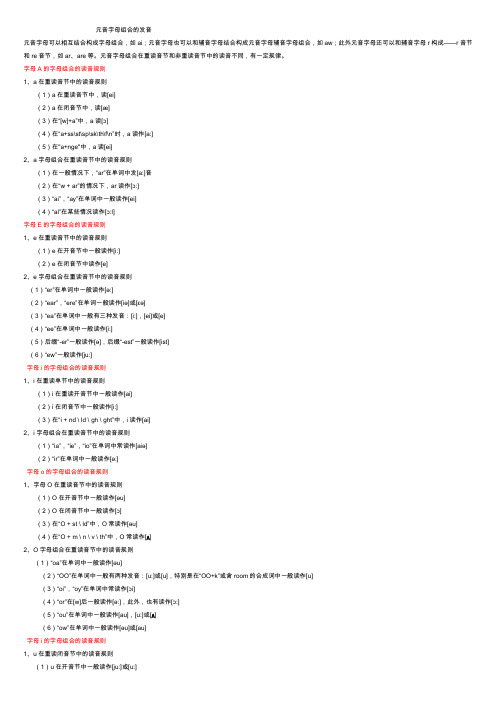
元音字母组合的发音元音字母可以相互结合构成字母组合,如ai;元音字母也可以和辅音字母结合构成元音字母辅音字母组合,如aw;此外元音字母还可以和辅音字母r构成——r音节和re音节,如ar、are等。
元音字母组合在重读音节和非重读音节中的读音不同,有一定规律。
字母A的字母组合的读音规则1、a在重读音节中的读音规则(1)a在重读音节中,读[ei](2)a在闭音节中,读[æ](3)在“[w]+a”中,a读[כ](4)在“a+ss\st\sp\sk\th\f\n”时,a读作[a:](5)在"a+nge"中,a读[ei]2、a字母组合在重读音节中的读音规则(1)在一般情况下,“ar”在单词中发[a:]音(2)在“w + ar”的情况下,ar读作[כ:](3)“ai”,“ay”在单词中一般读作[ei](4)“al”在某些情况读作[כ:l]字母E的字母组合的读音规则1、e在重读音节中的读音规则(1)e在开音节中一般读作[i:](2)e在闭音节中读作[e]2、e字母组合在重读音节中的读音规则(1)“er”在单词中一般读作[ə:](2)“ear”,“ere”在单词一般读作[iə]或[εә](3)“ea”在单词中一般有三种发音:[i:],[ei]或[e](4)“ee”在单词中一般读作[i:](5)后缀“-er”一般读作[ə],后缀“-est”一般读作[ist](6)“ew”一般读作[ju:]字母i的字母组合的读音规则1、i在重读单节中的读音规则(1)i在重读开音节中一般读作[ai](2)i在闭音节中一般读作[i:](3)在“i + nd \ ld \ gh \ ght”中,i读作[ai]2、i字母组合在重读音节中的读音规则(1)“ia”,“ie”,“io”在单词中常读作[aiə](2)“ir”在单词中一般读作[ə:]字母o的字母组合的读音规则1、字母O在重读音节中的读音规则(1)O在开音节中一般读作[əu](2)O在闭音节中一般读作[כ](3)在“O + st \ ld”中,O常读作[əu](4)在“O + m \ n \ v \ th”中,O常读作[۸]2、O字母组合在重读音节中的读音规则(1)“oa”在单词中一般读作[əu](2)“OO”在单词中一般有两种发音:[u:]或[u],特别是在“OO+k”或含room的合成词中一般读作[u](3)“oi”,“oy”在单词中常读作[כi](4)“or”在[w]后一般读作[ə:],此外,也有读作[כ:](5)“ou”在单词中一般读作[au],[u:]或[۸](6)“ow”在单词中一般读作[əu]或[au]字母i的字母组合的读音规则1、u在重读闭音节中的读音规则(1)u在开音节中一般读作[ju:]或[u:](2)u在闭音节中一般读作[۸]或[u]2、u字母组合在重读音节中的发音规则(1)“ur”在单词中一般读作[ə:](2)“ure”在单词中一般读作[juə]或[uə](3)“ui”在单词中一般情况下读作[ju:]辅音字母及辅音字母组合在重读音节中的读音规则字母b的字母组合的读音规则(1)b一般读作[b](2)bt \ mb在词尾时,b常不发音字母c的字母组合的读音规则(1)当字母C在元音字母a,o,u或另一个辅音字母前或是在词尾时,c读作[k](2)在“c + ia \ ie 或io”中,c一般读作[ ∫](3)“ch”字母组合一般读作[ t∫],[k]或[ ∫](4)在“c+e,i或y”中,c一般读作[s]字母d的字母组合的读音规则(1)d一般读作[d](2)dge在词尾时,一般读作[dƷ](3)后缀“-ed”的读音规则如下:1.“-ed”前是清辅音([t]除外)时,一般读作[t]2.“ed”前是浊辅音([d]除外)或元音时,一般读作[d]3.“-ed”前是[ t ] 或[ d ] 音时,一般读作[ id ]字母f的字母组合的读音规则(1)f一般读作[f](2)“ften”字母组合一般读作[ fn ]字母g的字母组合的读音规则(1)g一般读作[g](2)在“g + e \ i 或y ”中或者“-ge”在词尾时,一般读作[dƷ](3)“gu”在词首或者“gue”在词尾时,一般读作[g](4)“gh”在词尾时,一般读作[f](5)“ght”字母组合一般读作[t]字母h的字母组合的读音规则(1)h一般读作[h](有时h不发音)字母j的字母组合的读音规则(1)j一般读作[dƷ]字母k的字母组合的读音规则(1)k一般读作[k](2)“kn”字母组合在词首时,k不发音,常读作[n]字母l的字母组合的读音规则(1)L及字母组合“LL”一般读作[l]字母m的字母组合的读音规则(1)m一般读作[m](2)“mn”在词尾时,可读作[m]字母n的字母组合的读音规则(1)n在一般情况下读[n](2)字母组合“ng”在词尾时,一般读作[ŋ];在词中时,一般读作[ŋg]字母p的字母组合的读音规则(1)p一般读作[p](2)字母组合“ph”一般读作[f]字母q的字母组合的读音规则(1)一般情况下,q很少单独出现,字母组合“qu”在词首时,常读作[kw] 字母r的字母组合的读音规则(1)r一般读作[r]字母s的字母组合的读音规则(1)s在词首时,一般读作[s];在两个元音字母之间时,常读作[z](2)在“元音字母+s+不发音的e”中,名词或形容词多读[s],动词多读[z](3)在单词中,s后是清辅音时常读[s],s后是浊辅音时常读[z](4)在“s+u,ua或io”中,s常读作[ ∫]或[ Ʒ](5)“ss”字母组合一般读作[ s](6)“sh”字母组合一般读作[ ∫](7)“sten”字母组合一般读作[sn](8)后缀-(e)s的读音规则如下:1.在“清辅音( [s] \ [t∫] \ [∫] 除外)+(e)s”中,(e)s常读作[s]2.在“浊辅音( [z] \ [dƷ] 除外)+(e)s”或“元音+(e)s”中,(e)s常读作[z]3.在“[∫] \ [s] \ [z] \ [t∫] \ [dƷ]+(e)s”中,(e)s常读作[iz]4.当读[θ]的th前为元音时,加s后,原词尾的[θ]变为[ð],s读作[z] 字母t的字母组合的读音规则(1)t一般读作[t](2)字母组合“tion”一般读作[ ∫ən](“tion”前有s时,一般读作[t∫ən])(3)th在冠词、代词、介词、连词、副词中常读作[ð](4)th在名词、动词、形容词、数词中常读作[ð](5)字母组合“ther”在单词中常读[ðə]字母v的字母组合的读音规则(1)v一般读作[v]字母w的字母组合的读音规则(1)w一般读作[w](2)“wr”字母组合一般读[r],其中w不发音(3)“wh”字母组合有两种读音:[w]或[h]字母x的字母组合的读音规则(1)x一般读作[ks](2)当“x+重读元音”时,x读作[gz]字母y的字母组合的读音规则(1)当字母y作为辅音字母在词首时,读作[ j ]字母z的字母组合的读音规则(1)z一般读作[z]。
元音字母及其组合的发音(七全)
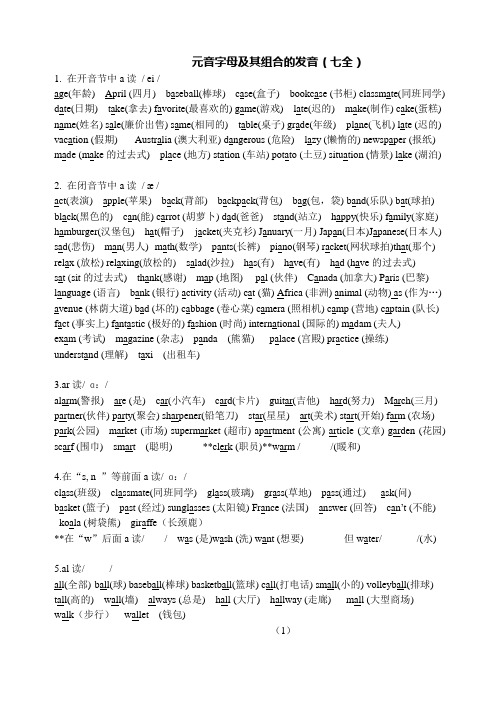
元音字母及其组合的发音(七全)1. 在开音节中a读/ ei /age(年龄) April (四月) baseball(棒球) case(盒子) bookcase (书柜) classmate(同班同学) date(日期) take(拿去) favorite(最喜欢的) game(游戏) late(迟的) make(制作) cake(蛋糕) name(姓名) sale(廉价出售) same(相同的) table(桌子) grade(年级) plane(飞机) late (迟的) vacation (假期) Australia (澳大利亚) dangerous (危险) lazy (懒惰的) newspaper (报纸) made (make的过去式) place (地方) station (车站) potato (土豆) situation (情景) lake (湖泊)2. 在闭音节中a读/ æ /act(表演) apple(苹果) back(背部) backpack(背包) bag(包,袋) band(乐队) bat(球拍) black(黑色的) can(能) carrot (胡萝卜) dad(爸爸) stand(站立) happy(快乐) family(家庭) hamburger(汉堡包) hat(帽子) jacket(夹克衫) January(一月) Japan(日本)Japanese(日本人) sad(悲伤) man(男人) math(数学) pants(长裤) piano(钢琴) racket(网状球拍)that(那个) relax (放松) relaxing(放松的) salad(沙拉) has(有) have(有) had (have的过去式)sat (sit的过去式) thank(感谢) map (地图) pal (伙伴) Canada (加拿大) Paris (巴黎) language (语言) bank (银行) activity (活动) cat (猫) Africa (非洲) animal (动物) as (作为…) avenue (林荫大道) bad (坏的) cabbage (卷心菜) camera (照相机) camp (营地) captain (队长) fact (事实上) fantastic (极好的) fashion (时尚) international (国际的) madam (夫人)exam (考试) magazine (杂志) panda (熊猫) palace (宫殿) practice (操练) understand (理解) taxi (出租车)3.ar读/ ɑ:/alarm(警报) are (是) car(小汽车) card(卡片) guitar(吉他) hard(努力) March(三月) partner(伙伴) party(聚会) sharpener(铅笔刀) star(星星) art(美术) start(开始) farm (农场) park(公园) market (市场) supermarket (超市) apartment (公寓) article (文章) garden (花园) scarf (围巾) smart (聪明) **clerk (职员)**warm / /(暖和)4.在“s, n ”等前面a读/ ɑ:/class(班级) classmate(同班同学) glass(玻璃) grass(草地) pass(通过) ask(问) basket (篮子) past (经过) sunglasses (太阳镜) France (法国) answer (回答) can’t (不能) koala (树袋熊) giraffe(长颈鹿)**在“w”后面a读/ / was (是)wash (洗) want (想要) 但water/ /(水)5.al读/ /all(全部) ball(球) baseball(棒球) basketball(篮球) call(打电话) small(小的) volleyball(排球) tall(高的) wall(墙) always (总是) hall (大厅) hallway (走廊) mall (大型商场)walk(步行)wallet (钱包)(1)day(日子) May(五月) may(可以) maybe(可能) play(玩) say(说) stay(呆) today(今天) way(方法) birthday(生日) always (总是) pay (付钱) yesterday (昨天) mail (邮件)rain (雨水) rainy (下雨的) straight (笔直的) wait (等待) waiter (侍者)7.ay读/ I /holiday(假期) Sunday(星期日)Monday(星期一)Tuesday(星期二)Wednesday (星期三)Thursday (星期四)Friday(星期五)Saturday(星期六)8.air,eir ,are, ere, ear, aw读/ /air(空气) hair(头发) chair(椅子) pair(一对) their (他们的) square (广场) there (那儿) wear (穿) bear (熊) saw (see的过去式) awful (极坏的)9.e在开音节中读/ i: /she(她)he (他)me(我)we(我们)e-mail(电子邮件)evening(晚上)Chinese(中文)these(这些)Japanese(日文)medium (中等的) thief (小偷)10.e在闭音节中读/ e /seven(七)seventh(第七)question(问题) telephone (电话)pencil-case(文具盒)pen(钢笔)yes(是)spell(拼写)friend(朋友)very(非常)bed(床)dresser(梳妆台)next(下一个)desk(书桌)tennis(网球)let(让)welcome(欢迎)collection(收集)every(每个)French(法国的)egg(蛋vegetable(蔬菜)help(帮助Wednesday(星期三)red(红色)ten (十)tenth(第十)eleven(十一)eleventh(第十一)twelve(十二)twelfth(第十二)twenty(二十)twentieth(第二十)sell(出售)yellow(黄色)when (什么时候)February(二月)September (九月)November(十一月get(得到)December(十二月)second (第二)event(事件)letter(信件)documentary(记录片)best(最好)tell(告诉)chess(棋)then(然后)address(地址)hotel(宾馆)belt (皮带) restaurant (饭馆) accessory (饰品) center (中央) central (中心的) clever (聪明的) direction (方向) elephant (大象) else (其他的) everyone (每个人) left (左边) expensive (贵的) friendly (友好的) regular (规则的) irregular (不规则的) menu (菜单) never (决不) penguin (企鹅) present (礼物) remember (牢记) sex (性别) west (西边) special (特色菜) spend (度过) suggestion (意见) terrible (很糟的) went (go的过去式) yesterday (昨天) test (小测试)11.ea读/ i: /please(请)cream(奶油)e at(吃)meat(肉) read(读)speak (讲)teacher(教师)beach (海滩) cheap (便宜的) clean (干净的) heat (热) leaf (叶子) meat (肉) reason (原因) tea (茶叶) team (小组)(2)head (头) bread (面包) heavy (重的) health (健康) sweater (毛衣) weather(天气)13.ea读/ / idea (主意) really (真的)14.ear读/ /ear (耳朵) near(在附近) hear (听见) dear (亲爱的) tears (眼泪) beard(下巴上的胡子)15.ee读/ i: /meet (遇见)three(三)see(看见)need(需要)between(两者之间)green(绿色)thirteen(十三)thirteenth(第十三)fourteen(十四)fourteenth(第十四)fifteen(十五)fifteenth(第十五)sixteen(十六)sixteenth(第十六)seventeen(十七)eighteen(十八)seventeenth(第十七)eighteenth(第十八)nineteen(十九)nineteenth(第十九)weekend(周末)agree (赞同) beef (牛肉) feel (感到) sleep (睡觉) street (大街)16.er,or,ar读/ /number(数字)ruler(尺子)computer(电脑)sister(姐妹)father(父亲)brother(兄弟)grandmother(祖母)grandfather(祖父)drawer(抽屉)under(在下面)eraser(橡皮)soccer(足球)hamburger(汉堡包)dinner(主餐)runner(跑步者)conversation(对话)thriller(恐怖片)swimmer(游泳者)shower(阵雨)after(在之后)teacher(教师)afternoon(下午)partner(同伴)sharpener(刀具)answer(回答)reporter (记者) singer (歌手) waiter (侍者) yesterday (昨天) winter (冬天) doctor (医生) actor (演员) visitor (访问者) dollar (美元) regular (规则的) popular (受欢迎的) beggar(乞丐)17.ey,ei读/ ei /survey(调查)they(他们)neighborhood (附近)18. ey读/ I / monkey (猴子) Sydney (悉尼) money (钱)19.i,y 读/ ai /nice(好的)nine(九)behind(在后面)like(喜欢)ice(冰)white(白色) nineteen(十九) time(时间)price (价格) write(写)fine(好的)nineteenth(第十九)ninth(第九)kind(种类)find(找到)exciting(激动的) Chinese(中文) China(中国) violin(小提琴) Friday (星期五) biology(生物)science (科学) tired (累)library (图书馆)arrive (到达) decide (决心) describe (描述) dining (进餐) guide (向导) idea (主意) size (尺寸)lie (躺) lion (狮子) mind (介意) quiet (安静的) rice (米饭) surprised (感到惊讶的) tiger (老虎) cry (叫喊,哭) shy (害羞的)(3)night(夜里)high (高的) right (正确的)light(光线) fight(打架)height (高度)21.i,y读/ I /his(他的) six(六)family(家庭) this(这个)dictionary(字典) English(英语) ring (戒指) sister(姐妹) thing (东西)big(大的)bring(带来) picture(图画)tennis(网球)boring(无聊的)interesting(有趣的)difficult(困难的)relaxing(放松的)broccoli(花菜)chicken(鸡肉)dinner(主餐)fifteen(十五)which(哪一个)with(与一起)fifteenth(第十五)fifth(第五)sixteenth(第十六)twentieth(第二十)thirtieth(第三十)sing(唱)trip(旅途)movie(电影)thriller(恐怖片)think(认为)favorite(最喜欢guitar(吉他)swim(游泳)piano(钢琴)swimmer(游泳者)children(孩子们)kid(孩子)musician(音乐家)little(小的)morning(早上)listen(听)evening(晚上)wish(希望)city(大城市)strict(严格)live (居住) dislike (不喜欢) little (一点儿) bit (一点儿) anything (任何事) assistant (助手) beginning (开端) bingo(宾戈)build(建造)bridge(桥)delicious(美味的)district(区域)fish(鱼)give(给)Singapore(新加坡)king(国王)middle(中间的)opinion(观点)sit(坐)sitcom(情景喜剧)skill(杀死)thin(瘦的)visit(参观)winter(冬天)gym(体育馆)pretty(漂亮的Sydney(悉尼)22.i读/ i: /magazine(杂志) police(警察) policeman (男警察) policewoman(女警察)23.ir,ur,er,ere, (w)or读/ /first(第一)girl(女孩)T-shirt(短袖衬衫)thirteen(十三)thirty(三十)third (第三)thirteenth (第十三)thirtieth(第三十)birth (出身)birthday(生日)bird (鸟) dirty(脏的) sir(先生) curly(卷的) nurse(护士) turn(转动) her(她的) person(人) verb(动词) were(是) word (单词) world(世界) work(工作) worker(工人)24.o读/ /hello(喂)zero(零)phone(电话)note(注解)those(那些)photo(照片)sofa(沙发)old(旧的)tomato(番茄)clothes(衣服)open(打开)also(也)home(家)piano(钢琴)October(十月)November(十一月)Tokyo(东京)cold(冷的) hope(希望) joke (笑话) koala(树袋熊) potato(土豆)wrote(写) post(邮政) most (大多数) host (主人)25.oa读/ /road(马路) coat(外衣) raincoat(雨衣) goat(山羊) soap(肥皂)(4)clock(钟)not(不)lost(丢失)soccer(足球)volleyball(排球)broccoli(花菜)orange(橘子)lot(许多) sock (短袜)dollar(美圆)long(长的)from(从…来)shop(商店)October(十月)documentary(记录片)comedy(喜剧片)opera(歌剧)often(经常)job(工作)rock(岩石)mom(妈妈)biology(生物)across(横过) Toronto (多伦多) office(办公室) blonde (金黄色的) Boston(波士顿) box(箱子)doctor(医生) dolphin(海豚) follow(跟) following(下面的) geography(地理) hot(热的) hospital(医院) Moscow(莫斯科) popular(受欢迎的) pop (流行的) porridge (粥,稀饭) sitcom(情景喜剧) song (歌曲) stop(停)27.o读/ /mother(母亲)brother(兄弟) grandmother(祖母)son(儿子)love(爱)some(一些)color(颜色)come(来)month(月)London(伦敦)Monday(星期一)other (其他)someone(有人)sometimes(有时)something(某物)colorful(多彩的) front(前方) money(钱) nothing(没东西) onion(洋葱)28.or, oor our, ,ore读/ /for(为)morning(早上)sport(体育)forty(四十) short (短的)shorts (短裤)horse(马) New York(纽约) corner(角落) form (形式) order (预定)report (报道) reporter(记者) story (故事) uniform (制服) airport(飞机场) floor(地板)door(门)your(你的)four(四)fourteen(十四)fourth (第四)fourteenth(第十四)yourself(你自己)before(在之前)store (商店)Singapore(新加坡)29.oo读/ u: /school(学校cool (凉爽) too(也)soon(马上)food(食物)afternoon(下午)noon(中午) tooth(牙齿)zoo (动物园) moon(月球) room(房间) noodle(面条) pool(水池)30.oo读/ /look(看)book (书本)bookcase(书柜)good(好的)foot(脚)cook(烹饪)31.ow 读/ /yellow(黄色)know(知道)show(给…看)row (横排) snow (雪) bowl (碗) window (窗) follow(跟) following (下面的) Moscow(莫斯科)32.tion/ / /dictionary(字典)conversation(对话)action(动作)collection(搜集)direction(方向) international(国际的) station(车站) situation(情景)(5)33.tion / / question(问题)suggestion(建议)34.oi, oy读/ /join (参加) noise (噪音) boy (男孩) toy (玩具) joy (欢乐) enjoy (享受快乐) 35.ou,ow读/ /found(找到)sound(听起来) about(有关)around(在周围)house(房屋) mouse(老鼠) mouth(嘴巴) count(数一数) blouse(女衬衫) cloudy(多云的) loudly(响亮的) mountain(高山) out(在外) outside(外面) south(南面) shower(阵雨)how (怎么) brown (棕色的) down (向下) now (现在) cow (母牛) town (城镇) crowded(拥挤的)36.ou读/ / young(年轻的) country(国家)37.ou读/ u: / soup (汤) group(小组) through(穿过)38.u,ew读/ ju: /Tuesday(星期二)unit(单元)usually(通常)documentary (记录片)music (音乐)musician(音乐家)student(学生)united(联合的) supermarket(超市) beautiful(美丽的) cute(可爱的) humid (潮湿的) menu(菜单) museum (博物馆) regular(规则的)popular (受欢迎的) uniform(制服) during(在…期间) new(新的) news(新闻) newspaper(报纸) knew(知道)39.u,o在开音节中读/ u: /blue(兰色)June(六月)ruler(尺子)Hutung (胡同) rule (统治) fruit(水果)juice (果汁) improve (提高) shoe (鞋)40.u读/ /bus(巴士)but(但是)club(俱乐部)drum(鼓)fun(有趣)f unny(古怪的)lunch(中饭)much(许多)number(数字)run(跑步) runner(跑步者)study(学习)summer(夏天)Sunday(星期日)uncle(叔叔)under(在下面)understand (理解) us(我们)trumpet(喇叭) culture(文化) discuss(讨论) dumpling(饺子) hungry(饥饿) just(仅仅) mutton(羊肉) sunglasses(太阳镜) ugly(丑的) unfriendly(不友好的) sunny(晴的)(6)。
元音字母组合发音表

元音字母组合发音表元音字母是指英语字母表中的"a", "e", "i", "o", "u"以及它们的发音组合。
以下是元音字母组合的发音表:1. "ai" 发音为 /eɪ/,例如,rain(雨);2. "ay" 发音为 /eɪ/,例如,say(说);3. "ei" 发音为 /eɪ/,例如,vein(静脉);4. "ea" 在不同情况下可以发音为 /iː/(例如,sea 海洋)、/ɛ/(例如,head 头)、/eɪ/(例如,break 打破);5. "ee" 发音为 /iː/,例如,see(看见);6. "ie" 在不同情况下可以发音为 /aɪ/(例如,pie 派)、/iː/(例如,belief 信念);7. "oa" 发音为 /oʊ/,例如,boat(船);8. "oo" 在不同情况下可以发音为 /ʊ/(例如,book 书)、/uː/(例如,moon 月亮);9. "ou" 在不同情况下可以发音为 /aʊ/(例如,house 房子)、/əʊ/(例如,goat 山羊);10. "oy" 发音为 /ɔɪ/,例如,boy(男孩);11. "au" 发音为 /ɔ/ 或 /ɑ/,例如,autumn(秋天);12. "aw" 发音为 /ɔ/,例如,saw(锯);13. "ow" 在不同情况下可以发音为 /aʊ/(例如,cow 牛)、/oʊ/(例如,slow 慢)。
以上是一些常见的元音字母组合及其发音,希望能够帮助到你。
如果你需要更多的信息或者有其他问题,请随时告诉我。
元音字母组合发音规律

二、元音字母组合的发音规律元音字母组合有很多,但很多字母组合的发音却有一个共同规律:那就是由两个元音字母组成的元音字母组合发第一个元音字母的名称音,第二个字母不发音。
发音规律如下:1. 字母组合ai通常读长音/ei/。
有一个例外said读作/sed/。
2.字母组合ay通常读长音/ei/,也就是第一个元音字母的名称音。
有一个例外says读作/sez/。
在非重读音节里读/i/. 如:Monday[ˈmʌndi], Tuesday[ˈtju:zdi]等。
3. 字母组合ea通常读长音/i:/,也就是第一个元音字母的名称音。
例如:pea[piː], sea[si:],tea[ti:], beach [bi:tʃ], read[ri:d], lead, beat, meat 除此之外,字母组合ea还可读短音/e/,例如:head [hed], bread[br ed], weather [ˈweðə], sweater[ˈswetə], heavy[ˈhevi] 在个别情况下还可读双元音/ei/, 例如:great[ɡreit], break[breik], steak[steik]等..4.字母组合ee通常读长音/i:/,也就是第一个元音字母的名称音。
例如:sneeze [sni:z] vi.打喷,speech[spi:tʃ],sweet [swi:t],week[wi:k]5.字母组合oa通常读长音/əu /,也就是第一个元音字母的名称音。
试读下列单词: road[roʊd ], toad[təud], load[ləud], goat[ɡəut], boat[bəut], coat[kəut], soak [səuk] 浸泡, soap [səup]6.. 字母组合ie可读长音/аi /,也就是第一个元音字母的名称音。
例如:pie [pai],lie[lai]字母组合ie还可以读长音/i:/。
元音字母组合的发音规则

元音字母组合的发音元音字母可以相互结合构成字母组合,如ai;元音字母也可以和辅音字母结合构成元音字母辅音字母组合,如aw;此外元音字母还可以和辅音字母r构成——r音节和re音节,如ar、are等。
元音字母组合在重读音节和非重读音节中的读音不同,有一定规律。
字母A的字母组合的读音规则1、a在重读音节中的读音规则(1)a在重读音节中,读[ei](2)a在闭音节中,读[æ](3)在“[w]+a”中,a读[כ](4)在“a+ss\st\sp\sk\th\f\n”时,a读作[a:](5)在"a+nge"中,a读[ei]2、a字母组合在重读音节中的读音规则(1)在一般情况下,“ar”在单词中发[a:]音(2)在“w + ar”的情况下,ar读作[כ:](3)“ai”,“ay”在单词中一般读作[ei](4)“al”在某些情况读作[כ:l]字母E的字母组合的读音规则1、e在重读音节中的读音规则(1)e在开音节中一般读作[i:](2)e在闭音节中读作[e]2、e字母组合在重读音节中的读音规则(1)“er”在单词中一般读作[ə:](2)“ear”,“ere”在单词一般读作[iə]或[εә](3)“ea”在单词中一般有三种发音:[i:],[ei]或[e](4)“ee”在单词中一般读作[i:](5)后缀“-er”一般读作[ə],后缀“-est”一般读作[ist](6)“ew”一般读作[ju:]字母i的字母组合的读音规则1、i在重读单节中的读音规则(1)i在重读开音节中一般读作[ai](2)i在闭音节中一般读作[i:](3)在“i + nd \ ld \ gh \ ght”中,i读作[ai]2、i字母组合在重读音节中的读音规则(1)“ia”,“ie”,“io”在单词中常读作[aiə](2)“ir”在单词中一般读作[ə:]字母o的字母组合的读音规则1、字母O在重读音节中的读音规则(1)O在开音节中一般读作[əu](2)O在闭音节中一般读作[כ](3)在“O + st \ ld”中,O常读作[əu](4)在“O + m \ n \ v \ th”中,O常读作[۸]2、O字母组合在重读音节中的读音规则(1)“oa”在单词中一般读作[əu](2)“OO”在单词中一般有两种发音:[u:]或[u],特别是在“OO+k”或含room的合成词中一般读作[u](3)“oi”,“oy”在单词中常读作[כi](4)“or”在[w]后一般读作[ə:],此外,也有读作[כ:](5)“ou”在单词中一般读作[au],[u:]或[۸](6)“ow”在单词中一般读作[əu]或[au]1、u在重读闭音节中的读音规则(1)u在开音节中一般读作[ju:]或[u:](2)u在闭音节中一般读作[۸]或[u]2、u字母组合在重读音节中的发音规则(1)“ur”在单词中一般读作[ə:](2)“ure”在单词中一般读作[juə]或[uə](3)“ui”在单词中一般情况下读作[ju:]辅音字母及辅音字母组合在重读音节中的读音规则字母b的字母组合的读音规则(1)b一般读作[b](2)bt \ mb在词尾时,b常不发音字母c的字母组合的读音规则(1)当字母C在元音字母a,o,u或另一个辅音字母前或是在词尾时,c读作[k](2)在“c + ia \ ie 或io”中,c一般读作[ ∫](3)“ch”字母组合一般读作[ t∫],[k]或[ ∫](4)在“c+e,i或y”中,c一般读作[s]字母d的字母组合的读音规则(1)d一般读作[d](2)dge在词尾时,一般读作[dƷ](3)后缀“-ed”的读音规则如下:1.“-ed”前是清辅音([t]除外)时,一般读作[t]2.“ed”前是浊辅音([d]除外)或元音时,一般读作[d]3.“-ed”前是[ t ] 或[ d ] 音时,一般读作[ id ]字母f的字母组合的读音规则(1)f一般读作[f](2)“ften”字母组合一般读作[ fn ]字母g的字母组合的读音规则(1)g一般读作[g](2)在“g + e \ i 或y ”中或者“-ge”在词尾时,一般读作[dƷ](3)“gu”在词首或者“gue”在词尾时,一般读作[g](4)“gh”在词尾时,一般读作[f](5)“ght”字母组合一般读作[t]字母h的字母组合的读音规则(1)h一般读作[h](有时h不发音)字母j的字母组合的读音规则(1)j一般读作[dƷ]字母k的字母组合的读音规则(1)k一般读作[k](2)“kn”字母组合在词首时,k不发音,常读作[n]字母l的字母组合的读音规则(1)L及字母组合“LL”一般读作[l]字母m的字母组合的读音规则(1)m一般读作[m](2)“mn”在词尾时,可读作[m]字母n的字母组合的读音规则(1)n在一般情况下读[n](2)字母组合“ng”在词尾时,一般读作[ŋ];在词中时,一般读作[ŋg](1)p一般读作[p](2)字母组合“ph”一般读作[f]字母q的字母组合的读音规则(1)一般情况下,q很少单独出现,字母组合“qu”在词首时,常读作[kw] 字母r的字母组合的读音规则(1)r一般读作[r]字母s的字母组合的读音规则(1)s在词首时,一般读作[s];在两个元音字母之间时,常读作[z](2)在“元音字母+s+不发音的e”中,名词或形容词多读[s],动词多读[z](3)在单词中,s后是清辅音时常读[s],s后是浊辅音时常读[z](4)在“s+u,ua或io”中,s常读作[ ∫]或[ Ʒ](5)“ss”字母组合一般读作[ s](6)“sh”字母组合一般读作[ ∫](7)“sten”字母组合一般读作[sn](8)后缀-(e)s的读音规则如下:1.在“清辅音( [s] \ [t∫] \ [∫] 除外)+(e)s”中,(e)s常读作[s]2.在“浊辅音( [z] \ [dƷ] 除外)+(e)s”或“元音+(e)s”中,(e)s常读作[z]3.在“[∫] \ [s] \ [z] \ [t∫] \ [dƷ]+(e)s”中,(e)s常读作[iz]4.当读[θ]的th前为元音时,加s后,原词尾的[θ]变为[ð],s读作[z] 字母t的字母组合的读音规则(1)t一般读作[t](2)字母组合“tion”一般读作[ ∫ən](“tion”前有s时,一般读作[t∫ən])(3)th在冠词、代词、介词、连词、副词中常读作[ð](4)th在名词、动词、形容词、数词中常读作[ð](5)字母组合“ther”在单词中常读[ðə]字母v的字母组合的读音规则(1)v一般读作[v]字母w的字母组合的读音规则(1)w一般读作[w](2)“wr”字母组合一般读[r],其中w不发音(3)“wh”字母组合有两种读音:[w]或[h]字母x的字母组合的读音规则(1)x一般读作[ks](2)当“x+重读元音”时,x读作[gz]字母y的字母组合的读音规则(1)当字母y作为辅音字母在词首时,读作[ j ]字母z的字母组合的读音规则(1)z一般读作[z]。
元音字母之间的组合发音
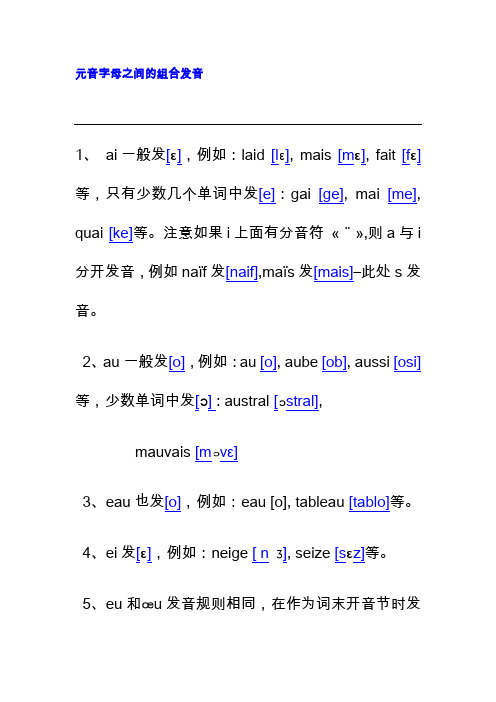
元音字母之间的组合发音1、ai一般发[],例如:laid [l], mais [m], fait [f]等,只有少数几个单词中发[e]:gai [ge], mai [me], quai [ke]等。
注意如果i上面有分音符« ¨ »,则a与i 分开发音,例如naïf发[naif],maïs发[mais]–此处s发音。
2、au一般发[o],例如:au [o], aube [ob], aussi [osi]等,少数单词中发[] : austral [stral],mauvais [m vε]3、eau也发[o],例如:eau [o], tableau [tablo]等。
4、ei发[],例如:neige [ n], seize [s z]等。
5、eu和u发音规则相同,在作为词末开音节时发[, []这个音和上海方言中“碗”,“安”的韵母相似。
例如:eu : bleu [bl], deux [d], peux [p]等,u : v u [v], n ud [n], b ufs [b]在辅音[z]前也发[]例如:creuse [kr z]–注意当中的s是在两个元音u和e之间要发[z]的音,因此eu在这单词中也发[]。
eu和u在其它情况中发[], []发音类似英语中的[ə :],但发音更加紧张有力。
例如在下列单词中发[]:eu : neuf [nœf], heure [œr] –记住h在法语中是不发音的, peur [pœr], veuve [v v]等;u:b uf[b f], s ur [s r], c ur [k r]注意:[ø]与[]在现在法语中有发音同化的趋势。
6、i在元音前发[j],例如:ciel [sj l]7、oi发[wa]同普通话中的“瓦”,例如:moi [mwa], toi [twa], quoi [kwa]。
8、ou发[u]同普通话的“乌”,例如:jour [ur], nous [nu],vous [vu]等;但在元音前发[w],类似江浙方言中的“核”的声母,例如:oui [wi], ouate [wat]等。
元音字母组合的发音

(5)、ex分别读作 [iks ],例: excuse, express, expensive; [eks], 例: expert, extra , excellent [igz] , 例: exact, examine, example
(7)、ay在重读音节中,读作[ei],例: say, away, play, today
ay在非重读音节中,读作[i], 例: Sunday, Saturday;例外:everyday[ei]
(8)、ar在重读音节中,读作[a:],例: car, farm, hard, party, pardon; 例外: war, warm[ɔ:]
(6)、ew读作[j u:],例: few, new, newspaper; 例 外:blew, flew[u:]
(7)、ere读作[εə ],例: there, where; 例外:here[iə]
(8)、er读作[ə:],例: her, person, certain, serve
(9)、eo读作[i:],例: people (10)、eigh读作[ei],例: weigh, weight;例外: height[ai]
练习
(B)1. A. spear B. earnest C. clear D. nearby (D)2. A. observe B. term C. certain D. terch (D)3. A. half B. hard C. heart D. heard (C)4. A. knew B. review C. sew D. news (A)5. A. exist B. expect C. experiment D. expose (D)6. A. dead B. peasant C. weather D. greatly (B) A. early B. dearly C. earth D. learn (A)8. A. thread B. cheat C. eager D. weave (B)9. A. whisper B. person C. eager D. perhaps (A)10. A. except B. exactly C. exist D. example
高三英语总复习 语音知识

第一章英语语音知识【考点聚焦】1、元音字母和元音字母组合的发音;2、辅音字母和辅音字母组合的发音;3、转换或派生词的发音;4、字母的不发音情况;5、单词附加词尾的读音。
一、基本读音规则归纳1、元音字母的读音:字母读音例词规则及位置例外Aa /ei/ game plate late tradetake spade translate graduateheadache operate liberateage face在重读或非重读开音节中have, café/æ/; vase /a:/; //averagebaggage cabbage chocolate comradecottage courage damage fortunatelylanguage luggage manage messagenecklace palace passage privateseparate(a.) surface village voyagemanager savage 此为词汇表中字母a在非重读开音节中读/i/所有单词。
// bag black glad plan thanklamp badly man bag happycapital jacket在重读闭音节中any many anything /e//a:/ class classmate classroomgrass glass pass passer-byvast past master last fastbroadcast staff answer danceplant advance,bath mask taskbasket在ss, st, sp,sk, th, f, n之前assistant astonish breakfast /ə/mass passage passengergrandma manner /æ /castle fasten /a:/taste waste bathe /ei//ɔ/ wash wander want wallet what 在w/wh之后water例外:/ɔ: //ə/ allow China machine againcamera vacation vegetablebreakfast pleasant magazinewoman在非重读音节中Ee /i:/ Chinese these be she we evecomplete在重读开音节中live、give例外:/ i//u/ bullet bulletin cruel full pull putpush/i/ busy business build例外ui /i/ /u:/ true blue June rule 在l,r,j之后/ə/ difficult industry support supply until unless autumn 弱读/非重读闭音节中minute /i/Yy /ai/ type satisfy /i/ pretty beauty2.元音字母组合字母字母组合位置与读音例词例外a ar /a:/ harm sharpwarm warn(在w后)ai 重读音节/ei/fail pain main against trainwaiter afraidbargain /i/said /e/tainBritain certain curtain /tn/fountainmountain/tn/ &/tin/contain obtain /tein/captain /tin/alwall ball call fall hall small tall walk chalk talk calm palm half在/f//m/前/ɑ:/shall /æ/almost already also although altogether alwaysalso salt /ɔ:l/au(gh) /ɔ:/autumn august cause taughtcaught daughter naughtyaunt laugh /ɑ:/aw /ɔ:/dawn draw law lawyer sawair,ere,are重读音节/eə/Air affair chair care share sharecompare glare square there wherehere merely /iə/are aren’t /ɑ:/ay(ai,ey)重读音节/ei/say way delay day may play mainmay gray/greysaid says /e/非重读音节中/i/Sunday, Monday holiday valleycaptaincertain Britain中ai发音/ə/e ea/i:/beat each easily league meatseason meantime stealreality /ri'æliti/beautiful /'bju:tifəl/不发音ocean非重读音节/ə/ /e/bread dead headache sweaterheavy, breakfast, health, featherpleasure/ei/Great break greatly/iə/idea realize real really theatre areaearappear beard clear dear ear fear hear near nearlynuclear tear(n.) year /iə/heart /ɑ:/ bear pear wear tear (v.) /eə/二、语音测试中常考和易错的单词:(单词拼写也侧重考查发音不规则、含双写字母、词形变化不规则的、根据发音易拼错的词汇)1、/ei/a:tale cave nature headache operate translate graduate danger change celebrate liberate classmate centigrade liberationai:failure straight sail explain remainay:day ray pay play delayea:break greatei:neighbour weight eight2、/i:/e:frequently fever metre recent complete evening scene reread immediately secret ie:believe field piece achieve thiefei:ceiling receivei:magazine police machineea:beast breathe reading ocean peace scream European increase3、/ai/i:flight wild satellite hide silence design lively biology ninth apologize silent tiny ei:either height4、/əu /o:robot gold post comb soldier suppose only wo n’t cl othes control progress motor ocean stove stoneow:arrow known flown grown flow bowl hollow show blow growou:shoulder soul althoughoa:throat coast5、/ju:/u:pupil student tube6、/ æ /a:capital natural naturally taxi Japan practice cattle candle ant translate Japanese canal national7、/e/ai (ay):said sayse :envelope develop merry whether unless secretary explanation rejectea :measure heavy bread head breath sweat weather meant feather treasure health deafa :ate any many8、/i/i :universe children technical notice hidden prison living opposite silvere :depend elect mathematics explain forest electricity event especial entire object pretty a :message package climate courage manage village language surface palace comrade savage necklace orangeo :womenu :minute busy businessai :mountain captainei :foreign 9、/ɔ/o :solid office topic biology concert wrong onto foreign along common strong lost obvious object dollar cloth forehead forest politics modern honour probably promise a :want wander wash watch wallet whatar :quarrelor :sorry borrow tomorrow sorrow10、/ ʌ /o :worry month government once tongue dozen wonder love comeou :double country trouble courage cousin southern touch11、/ɔ:/a :salt also always almost wateral :talk walk chalk wall ballou :thought bought fought broughtour :mourn pour four courseaw :saw law lawyerar :warm warnau (gh) :caught naughty autumn cause taught daughter astronautor, oor :door torn form worn forward floor12、/u:/ou :wounded route youth group soup routeoo :loose fool boot balloon food cool school tooth smooth pool moon choose o :prove move13、/ə:/er :refer personor :worse worthy worm word worst worship work worldear :earth research early learnur :church burst curtain fur14、/a:/a :rather grant basket example chance vase advancedFranceau:aunt laugh15、/u/o:wolf womanu:push pull sugaroo:foot cook wood childhood good took look shook stood hookoul:should would16、/ /o:Europe obey pollution observe develop politicali:possible terrible holiday beautifula:allow peasant servant library material breakfast Japan Japaneseu:success support succeed suggest supply suppose industry upon minus17、/au/ou:found founded round sounded trousers count south pronounce announceear:spear fear dear hear tear(n.)clear disappearea:realize theatre really realeo:theoryer:serious material period zero19、/eə/are:glare care dare stareere:where there thereforeear:wear bear tear(v.)ar:parent various Maryair:fair affair pair20、/aiə/ie:quiet society science diet scientific scientistire:empire entire tiresomeio:violin lion pioneeria:diary diamond dialogue21、/s/s:this writes sew research promis e it’s newspaper hospital loose mouse horse course close(adj.)worse coughs mouths stomachs house horse loose course promise c:medicine society voice advice price silence decision except22、/z/s:news Thursday his goes reads mothers as husband raise physical c ousin resist lose noise otherwise position possess nose cause newsreel lungs telegrams stones desert design wise robs houses season composition clothes close(v.)23、/θ/th:thing breath method maths wealth healthy worth south strength three through cloth birth bath youth mouth path24、/ð/th:they this that without gather mother father breathe neither smoothsouthern worthy baths youths mouths paths /ðz /25、/t/ed :missed asked watched practised reduced advanced wiped blocked stepped marched26、/d/ed :filled recognized whispered hugged changed robbed27、/k/ch :stomach character chemical technology headache technical technique chemist28、/t ⎰/ch :church chain chest cheerful charge check change achieve researcht (ion) :question suggestiontu :century natural fortunate29、/⎰/ch :machine moustache sh :shoe shallow shirt washs (s) :sure sugar Asia expression permissionc :special ocean musician officialt (ion) :liberation pollution graduation30、/f/gh :cough enough tough photo telegraph31、/eks/ex :exhibition exercise expert extra explanation excellent32、/iks/ex :explain expect exchange express experience excuse expensive33、/igz/ex :exact exist example examine34、/ŋ/n :trunk language bank anxious ink think rank donkeyfinger hungry English handkerchiefng :tongue long strong sing35、/ʒ/s :pleasure conclusion television decision revision usually36、/ × / 字母不发音:(1)b :comb tomb debt climb(2)h :honest hour forehead exhibition(3)w :wrong write answer sword wrap(4)t :often listen whistle Christmas listen(5)d :Wednesday handsome handkerchief★【焦点特例记忆】★say, says /ai/ ; foot /u/ food boot/u:/; nature/ei/ natural /æ/; nation /ei/, national /æ/; room /u:/,classroom /u/; know /əu/,knowledge /ɔ/;mean /i:/,meant /e/; hear /i ə/ heard /ə:/;exhibit/igz/. exhibition/eks/;youth /ju:/, young /ʌ/; bathe /ei ð/, bath /ɑ:θ/; bury /e/, busy /i/; great /ei/, break /ei/; cloth /ɔθ/, clothes /əu ð/, clothing /əu ð/; north /θ/,northern /ð/; use N./s/&V. /z/, useful/s/; sou th/auθ/, sou th ern/ʌð/; woman/u/,women/i/;house/s/, houses/ziz/;path/θ/, paths/ðz/,; mouth/θ/, mouths/ðz/; sing/iŋ/ singer/iŋə/;show /əu/, shower /au/; idea, real, really /iə/; friend/e/, thief /i:/;water/ɔ:/ , what/ɔ/,wash/ɔ/,want/ɔ/, watch/ɔ/; pull \full \put/u/;blood, flood/ʌ/,poor/uə/;any, many/e/ ;mayor/e/; English /i/, of/v/;Silent letter (注:划线的字母是不发音字母):climb\ comb\ tomb;knee \know knife;hour\ honest\honour;listen\ whistlehandsome\ Wednesday\sandwich;wrong;muscle;island。
常见的字母与字母组合发音规则

常见的字母与字母组合发音规则(I)元音字母及元音字母组合拼读规则●元音字母的发音(一)元音字母a1.重读开音节/ei/ paper;late;make;lake;face2.重读闭音节// bag;fat;cat;ladder;mass(*例外:any一些/e/ ;many许多/e/ )3.非重读音节// 或/i/即:// ——ago;al ong;among;above;aloud/i/ —— comrade;village;manager;palace;private;necklace*连续相同的辅音(字母),一般只发一个音,而且归属后一个音节段。
如上的ladder,village.4.在字母w或wh后面,发// was;wash;what;want;(*例外:water水/:/ )5.a在诸如-ance;-ask;-ass;-ast;-ath组合里,重读时均发/a:/即:dance;France;chance ask;mask;task;basket class;grass;glass;pass;——(*例外:mass// )fast;cast;past;last;master;father;path;bath;—— (*例外:maths// )(二)元音字母e1.重读开音节/i:/ me;he;she;these;evening2.重读闭音节/e/ hen;get;set;tell;echo3.非重读音节/i/ useless;ticket;basket;pocket;before;below;(三)元音字母i或y1.重读开音节/ai/ China;try;my;hi;time;guide;2.重读闭音节/i/ sit;hit;ill;little;system;3.非重读音节/i/ unit;study(四)元音字母o1.重读开音节/u/ no;so;go;home;photo;2.重读闭音节// not;hot;box;fox;cock;cost;3.非重读音节// purpose;concern4.o在字母m,n,v或th之前,均发//son;month;come;ton;(*例外:Tom// )love;dove;glove;above;anothermother;brother;become;some5.两个单词:woman/‘w u-mn/ 女人(单数);women/‘w i-min/ 女人(复数)(五)元音字母u1.重读开音节/ju:/ pupil;stud ent;use;cube2.重读闭音节// 或/u/即:// —— cut;luck;umbrella;us/u/ —— put;full;pull3.非重读音节// autumn;August;support●元音字母组合的拼读规则(一)元音字母a的字母组合1.ai或ay在重读音节中/ei/ rain;train;brain;painday;may;play;stay;lay*ay在非重读音里/i/ 或/ei/ Sunday;Monday;Tuesday;Thursday;Friday 2.al+ 绝大多数辅音字母/:/ small;wall;call;talk;walk;chalk或/:l/ also;always*al后面是k时,只发/:/al+f或m时,al发/a:/ half;calm-al在词尾非重读/()l/ medal;metal;(例外canal运河,重音在后/l/ ) 3.-ance在重读时/a:ns/ chance;dance;France在非重读时/ ns/ importance;performance;ambulance4.-ant非重读/nt/ assistant;important;peasant5.-ange一般/eind/ change;danger;strange;(*但orange/ind/ )6.-age一般/id/ village;carriage;marriage7.-ask一般重读时/a:sk/ ask;mask;task;basket8.-ass一般重读时/a:s/ class;glass;grass;pass;(*但mass// )9.-ast一般重读时/a:st/ last;past;fast;cast-aste一般/eist/ waste;paste;taste10.-ath一般/a:θ/ bath;path;(*但maths/θ/ )或/a:e/ father;rather;(*但gather/e/ )11.-au一般/:/ cause;autumn;August;(*但because// ) -augh(t)/:(t)/ caught;taught;daughter(*例外:laugh/la:f/ )12.-aw/:/ draw;saw;law;awful13.a在字母w或wh后面,a发// was;wash;want;what;(*但water/:/ )14.-ar重读音时/a:/ party;car;farm;army;yard;hard;star在字母w或音/w/ 后面时/:/ war;warm;warn;towards;*quarter在非重读音时/-/ beggar;dollar;solar15.-are一般/-ε/ hare;bare;dare;stare;rare;care;parent16.-air一般/-ε/ chair;fair;hair;pair;stair;repair17.-able一般/eibl/ able;cable;tabl e;stable(二)元音字母e的组合1.-ea重读音节有四个音,分别是下列:-ea/i:/ team;meat;lead;teach;read;mean;please;steal-ea/e/ threat;bread;meant;read(过去式和过去分词);peasant-ea/i/ real;really-ea/ei/ great;break2.-ee/i:/ feel;week;keep;three;steel;street;sweep;see*但是一个例外:coffee/i/3.-eer/i/ deer;pioneer;engineer;volunteer4.-er重读音节/:/ her;term;service;Germany非重读// worker;paper;western;teacher特殊读法/a:/ clerk5.-ere/i/ here;mere-ere或者发/ε/ there;where6.-ear有三种音,分别是;-ear/i/ ear;dear;near;clear;tear(n.);beard-ear/:/ early;earth;learn;heard-ear/a:/ heart*tear作为动词时,发/ε/7.-ei/ei/ eight;weigh;weight-ei/ai/ height-ei/i:/ receive8.-ey重读/ei/ they;hey;survey-ey重读/i:/ key-ey非重读/i/ monkey;donkey;valley;volleyball*-et非重读/it/ pocket;ticket;rocket9.-ew一般/ju:/ new;few;knew-ew或者发/u:/ grew;threw-ew还可以发/u/ sew10.-ege/id/ college11.-est/ist/ biggest;modest;happiest;12.词尾的-ed在浊音后/d/ lived;studied-ed在清音后/t/ worked;finished-ed在字母t或d后/id/ wanted;needed(三)元音字母i或y的组合1.-ie在重读音节中,或在辅音字母前,发/i:/ field;piece;achieve -ie在词尾/ai/ lie;die;tie2.-igh(t)在重读音节/ai(t)/ high;night;light;bright3.-ir在重读音节/:/ girl;firm;circle;first;third4.-ire在重读音节/‘ai/ fire;tired;hire;retired;wire5.-ild/aild/ child;wild6.-ind/aind/ find;kind;mind;wind;(*但window/ind/ )7.-ing/i/ king;wing;sing;doing;making8.-(a)tion/(ei)n/ nation;pronunciation;information;composition -stion/t n/ question-sion/n/ 或/n/ mission使命;precision精密9.-ye在词尾/ai/ good-bye;bye-bye10.-ist/ist/ list;fist;(四)元音字母o的组合1.-oa在重音时/u/ boat;coat;road;goat;toad-oar在重音时/:/ blackboard;aboard2.-oi,-oy在重音时/i/ boiler;point;join;oilboy;toy;joy;loyal3.-oo一般/u:/ soon;too;zoo;room;noon;food;mood;boot;moon*单词room和其他名词构成合成词时,常发短音。
元音和元音字母组合发音表

元音和元音字母组合发音表以下是英语中的元音和元音字母组合的发音表:单个元音:1. /æ/:如在"cat"中的"a"的发音。
2. /ɑː/:如在"car"中的"a"的发音。
3. /e/:如在"bed"中的"e"的发音。
4. /ə/:如在"about"中的"u"的发音。
5. /i/:如在"bit"中的"i"的发音。
6. /ɪ/:如在"hit"中的"i"的发音。
7. /ɒ/:如在"hot"中的"o"的发音。
8. /ɔː/:如在"born"中的"o"的发音。
9. /ʊ/:如在"book"中的"oo"的发音。
10. /uː/:如在"boot"中的"oo"的发音。
元音字母组合:1. /eɪ/:如在"day"中的"ay"的发音。
2. /aɪ/:如在"bike"中的"i"的发音。
3. /ɔɪ/:如在"boy"中的"oy"的发音。
4. /aʊ/:如在"house"中的"ou"的发音。
5. /əʊ/:如在"boat"中的"o"的发音。
6. /ɪə/:如在"beer"中的"ee"的发音。
7. /eə/:如在"care"中的"are"的发音。
元音字母及字母组合发音

ar 在重读音节中发 / ɑ: (r)/
car n. 小汽车 star n. 星星,明星
art n. 艺术,美术 party n. 聚会 card n.卡片 March n. 三月 large adj. 大的
far adj. 远的 market n.市场
dark adj.黑暗的,深色的
e 在重读开音节中发 / i: /
so conj.因此 adv. 如此,这么 hope v. 希望 hello int. 喂,你好
old adj. 旧的,年老的 phone n. 电话
sofa n. 沙发 those pron. 那些 clothes n. 衣服
no adv. 不 photo n.照片
o 在重读闭音节中发 ① / ɒ /
or 在非重读 音节中发 / ə /
doctor n. 医生,博士 visitor n. 游客
color n. 颜色 inventor n. 发明者,发明家
editor n.编辑 author n. 作家 competitor n. 竞赛者,竞争者
actor n. 演员 director n.主任,导演,部门负责人 translator n.翻译员
box n. 盒子,箱子 clock n. 钟 sock n. 袜子
lost adj. 丢失的 dollar n. 美元
long adj. 长的 model n.模型
stop v. 停止 frog n. 青蛙 shop n.商店
o 在m,n,th,v之前发 ② / ʌ /
come n. 来 love n. 爱 son n.儿子
a 在重读开音节中发 / eɪ /
game n. 游戏/运动/比赛 name n. 名字
元音字母组合发音规律,常用字母或字母组合与元音字母组合发音规律
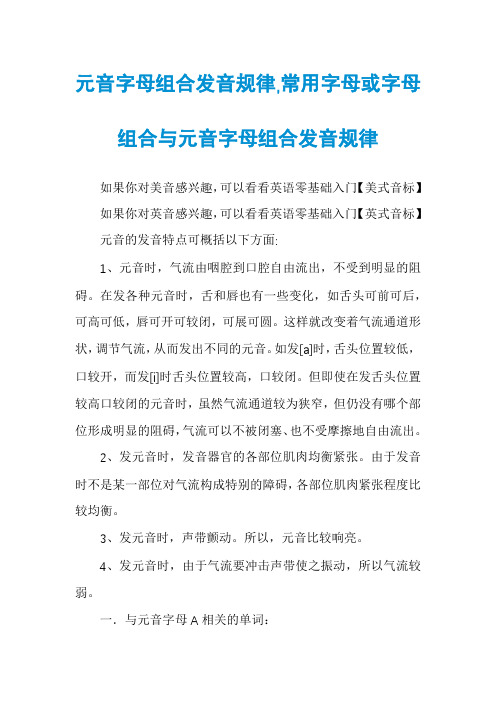
元音字母组合发音规律,常用字母或字母组合与元音字母组合发音规律如果你对美音感兴趣,可以看看英语零基础入门【美式音标】如果你对英音感兴趣,可以看看英语零基础入门【英式音标】元音的发音特点可概括以下方面:1、元音时,气流由咽腔到口腔自由流出,不受到明显的阻碍。
在发各种元音时,舌和唇也有一些变化,如舌头可前可后,可高可低,唇可开可较闭,可展可圆。
这样就改变着气流通道形状,调节气流,从而发出不同的元音。
如发[a]时,舌头位置较低,口较开,而发[i]时舌头位置较高,口较闭。
但即使在发舌头位置较高口较闭的元音时,虽然气流通道较为狭窄,但仍没有哪个部位形成明显的阻碍,气流可以不被闭塞、也不受摩擦地自由流出。
2、发元音时,发音器官的各部位肌肉均衡紧张。
由于发音时不是某一部位对气流构成特别的障碍,各部位肌肉紧张程度比较均衡。
3、发元音时,声带颤动。
所以,元音比较响亮。
4、发元音时,由于气流要冲击声带使之振动,所以气流较弱。
一.与元音字母A相关的单词:1.[ei] a在开音节中:发字母音,后面有不发音的eface脸;grade年级;cake蛋糕;lake湖; make制造;take 拿到;snake蛇;name名字; plane飞机;date日期; plate盘子;2.[æ] a在闭音节中:dad爸爸;sad悲伤的;bag书包;lamp灯;can能;fan 电风扇;man男人;and和;hand手;thank感谢;map地图;cat猫;fat肥胖的;that那个;hat帽子;rabbit兔子family家庭3.[a:] ar组合:car小汽车;far远的;star星星;card卡片;scarf围巾;marker水彩笔market市场department store百货商店apartment building公寓;hard努力地,硬的;park公园;arm胳臂;farm农场;4.[ei] ai组合;tail尾巴;rainy下雨的;train火车;wait等;waiter男服务员;waitress女服务员5.[eə] air组合:air空气;hair头发;chair椅子stairs楼梯6.[ei] ay组合:day天,日;today今天;play玩;may可以;May五月;way道路,方法;stay逗留7. [i] ay组合:Sunday 星期日Monday星期一Tuesday星期二Wednesday星期三Thursday星期四Friday星期五Saturday星期六8.[ɔ:] al组合:talk说话;walk走;chalk粉笔;9. [ɔ:l] all组合:all所有的ball球;small小的;tall高的;wall墙; mall大厅;call称呼,打电话;fall秋天,跌落10.[ a:s ]as或ass组合ask问;class班级;glass玻璃杯;pass传递;grass草;last 最后的;11. [ɔ] a在w后面wash洗what什么watch看,手表want想要12. [ɔ:] aw组合paws爪子draw画二.与元音字母E相关的单词:1.[i:] e在开音节中:发字母音be是;he他;she她;me我;we我们;these这些;Chinese2.[e] e在闭音节中:bed 床;red红色的;leg腿;spell拼写;hen母鸡;then 那么;when什么时候;pen钢笔;ten十;dress女裙;let让;3.[iə] ere组合;here这儿4. [iə] ere组合there 那儿;where哪儿4.[i:] ea组合;sea 海洋;tea茶;peach桃子;teacher教师;read读;please请;eat吃;meat肉;seat座位; dream做梦5.[e] ea组合;head头;bread面包;feather羽毛;weather天气;6.[iə] ear组合:ear耳朵;dear亲爱的;hear听见; near在。
元音字母组合的发音规则

通常发[ɔː]
roar, door, keyboard, bore
ow
通常发[aʊ]/[əʊ]
now, how, show, snow
ought
重读音节中通常发[ɔːt]
bought, thought, ought
gue
在词尾时,ue不发音,发[g]
tongue, dialogue, league
ou
通常发[aʊ]
about, count, mouth, house
oi/oy
通常发[ɔɪ]
oil, joy, toy, voice
ui
前面有辅音字母l、r、j时通常发[uː]
fruit, juice, cruise, recruit
注意:大家一定要注意区分重读音节和非重读音节哦,如上图所示,元音字母组合大部分是在重读音节中才会发那些音的,例如:mountain [ˈmaʊntən]重音在前面moun音节,所以此时ai不发[eɪ]的音,tain发[tən]的音。
ey
在重读音节词尾时通常发
[eɪ]
they, obey, prey, ley
ie
在重读音节中通常发[iː]
chief, field, piece, believe
oa
通常发[əʊ]
coat, boat, goal, float
oo
在重读音节中通常发[uː]
boot, cool, food, pool
注意:以上是常见的组合的发音规则,其他特殊情况在此就不一一列举了。
元音字母及组合的特殊发音规则
字母组合
发音规则
例子
aw, au, al
通常发[ɔː]
元音字母和字母组合读音
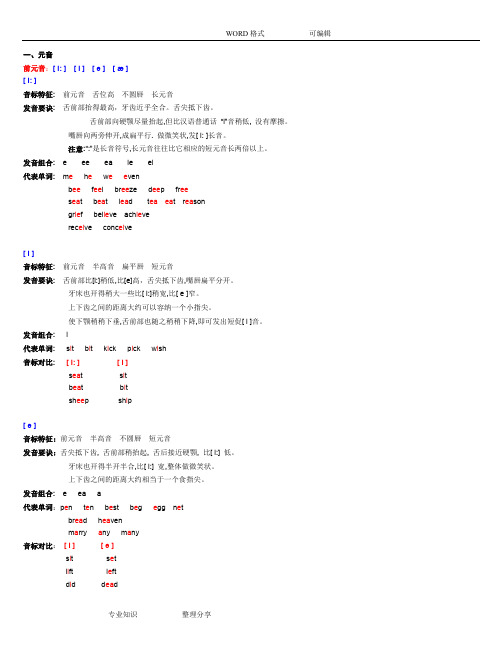
一、元音前元音:[ i: ] [ i ] [ e ] [ æ ][ i: ]音标特征:前元音舌位高不圆唇长元音发音要诀:舌前部抬得最高,牙齿近乎全合。
舌尖抵下齿。
舌前部向硬颚尽量抬起,但比汉语普通话“i”音稍低, 没有摩擦。
嘴唇向两旁伸开,成扁平行. 做微笑状,发[ i: ]长音。
注意:“:”是长音符号,长元音往往比它相应的短元音长两倍以上。
发音组合: e ee ea ie ei代表单词:m e h e w e e venb ee f ee l br ee ze d ee p fr ees ea t b ea t l ea d t ea ea t r ea songr ie f bel ie ve ach ie verec ei ve conc ei ve[ i ]音标特征: 前元音半高音扁平唇短元音发音要诀: 舌前部比[i:]稍低,比[e]高,舌尖抵下齿,嘴唇扁平分开。
牙床也开得稍大一些比[ i:]稍宽,比[ e ]窄。
上下齿之间的距离大约可以容纳一个小指尖。
使下颚稍稍下垂,舌前部也随之稍稍下降,即可发出短促[ i ]音。
发音组合: i代表单词: s i t b i t k i ck p i ck w i sh音标对比: [ i: ] [ i ]s ea t s i tb ea t b i tsh ee p sh i p[ e ]音标特征:前元音半高音不圆唇短元音发音要诀:舌尖抵下齿, 舌前部稍抬起, 舌后接近硬颚, 比[ i:] 低。
牙床也开得半开半合,比[ i:] 宽,整体做微笑状。
上下齿之间的距离大约相当于一个食指尖。
发音组合: e ea a代表单词:p e n t e n b e st b e g e gg n e tbr ea d h ea venm a rry a ny m a ny音标对比:[ i ] [ e ]s i t s e tl i ft l e ftd i d d ea d[æ]音标特征: 前元音低舌音不圆唇短元音发音要诀: 舌前部最低,双唇向两旁平伸,成扁平行牙床开的最大。
